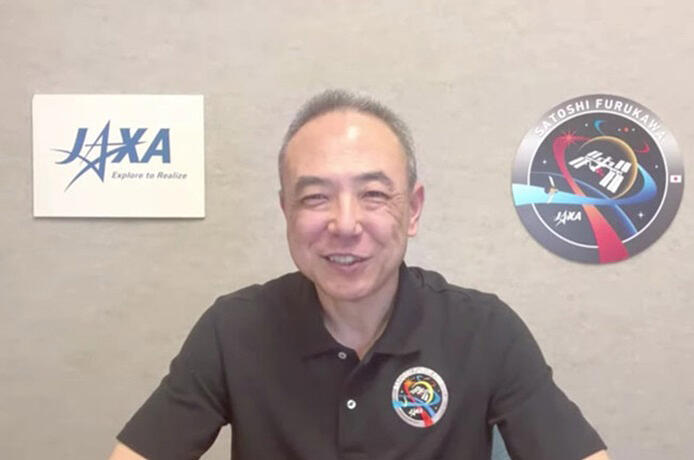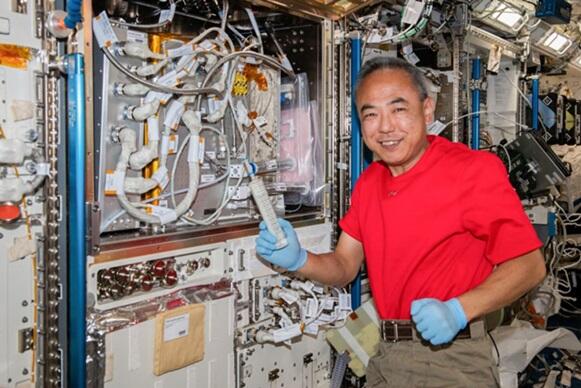Satoshi Furukawa, 60, who completed a six-and-a-half-month stay on the International Space Station (ISS), reflected at a press conference, "I felt that private space development and preparations for international lunar exploration are progressing." As he is a doctor, he has been posting detailed information about his physical changes on X (formerly Twitter) since his return, and at the press conference he said, "My body balance, neck, spine, and hip flexibility have decreased to the extent that I imagine this will happen when I am 80 years old. I realized that space is an accelerated simulation of aging."

From the online press conference
After returning to Earth on March 12 (Japan time), Furukawa continued his rehabilitation at NASA's Johnson Space Center in Texas to be used to gravity. The press conference was broadcast live online on April 24.
This was his second flight in 12 years, and he flew back and forth on the U.S.-based SpaceX "Crew Dragon," rather than the Russian Soyuz spacecraft he flew on the previous occasion. He said "I was impressed by the progress of space development by the private sector, including the involvement of companies in experiments on the Japanese Experiment Module Kibo." Through the demonstration of the water reclamation system and other activities, he also felt the development toward lunar exploration.
He explained that the ISS had exercise equipment to reduce muscle atrophy and bone loss, and that they were effective. On the other hand, he concretely described his physical condition immediately after his return: "I felt sick when I looked down, and I couldn't even put on socks. Supporting a head as heavy as a bowling ball made my posterior neck muscles sore and tired. My buttocks were sore in the area where I sat on the chair. I felt my spine and hip joints were noticeably stiffer this time (than last), perhaps due to my age." He has been going through rehabilitation and is almost back to his pre-flight physical condition.
He also explained the changes in the body caused by "fluid shift," which occurs when one's upper body is supplied with more fluid due to weightlessness. He also explained that the urge to urinate and have a bowel movement, which is different when one is in space, "does not have the same sensation as on the ground, where it accumulates below, and when you feel it, it is often more accumulated than on the ground."
In November 2022, the Japan Aerospace Exploration Agency (JAXA) announced that a number of fabrications, falsifications, and other irregularities had been found in a study on simulating life in space on Earth to examine its mental stress. In response, Furukawa, who was in charge of simulation's implementation, reinforced the verification of experiments and other work during this stay on the ISS. Furukawa said, "I read the experiment and verification procedure manuals thoroughly to get a firm grasp of the overall picture and conducted mental training under simulated condition. I did not hesitate to ask the controllers any questions I had, and I also double-checked. I had my colleagues on the ground watching the video (of my work) on the camera. I felt that we could work as a team and that communication was important," he summed up.
Furukawa left Earth last August 26, Japan time. During his stay on the ISS, he demonstrated a next-generation water reclamation system, conducted related work on an experiment to investigate how solid materials burn in microgravity, demonstrated a photography robot, conducted an experiment to explore how cells sense gravity, conducted related work on an experiment to create organs in microgravity, and released a nanosatellite. This space flight lasted 199 days. The total time he has spent in space is 366 days, the second longest in Japan after Koichi Wakata, 60, with 504 days.
Born in Kanagawa Prefecture in 1964, Furukawa holds a Doctor of Medicine. After a clinical and research career in gastrointestinal surgery, he was selected as an astronaut candidate in 1999. On his first flight in 2011, he spent five and a half months on the ISS. On the ground, he has promoted space medicine, including serving as the head of JAXA's Space Medicine and Biology Research Group.
Kimiya Yui (54) and Takuya Onishi (48) are scheduled to stay on the ISS for an extended period of time next year. Although not yet announced, Yui is expected to be on board the first fully operational Starliner, a new type of ship from Boeing of the United States.

Provided by JAXA and NASA
Original article was provided by the Science Portal and has been translated by Science Japan.




